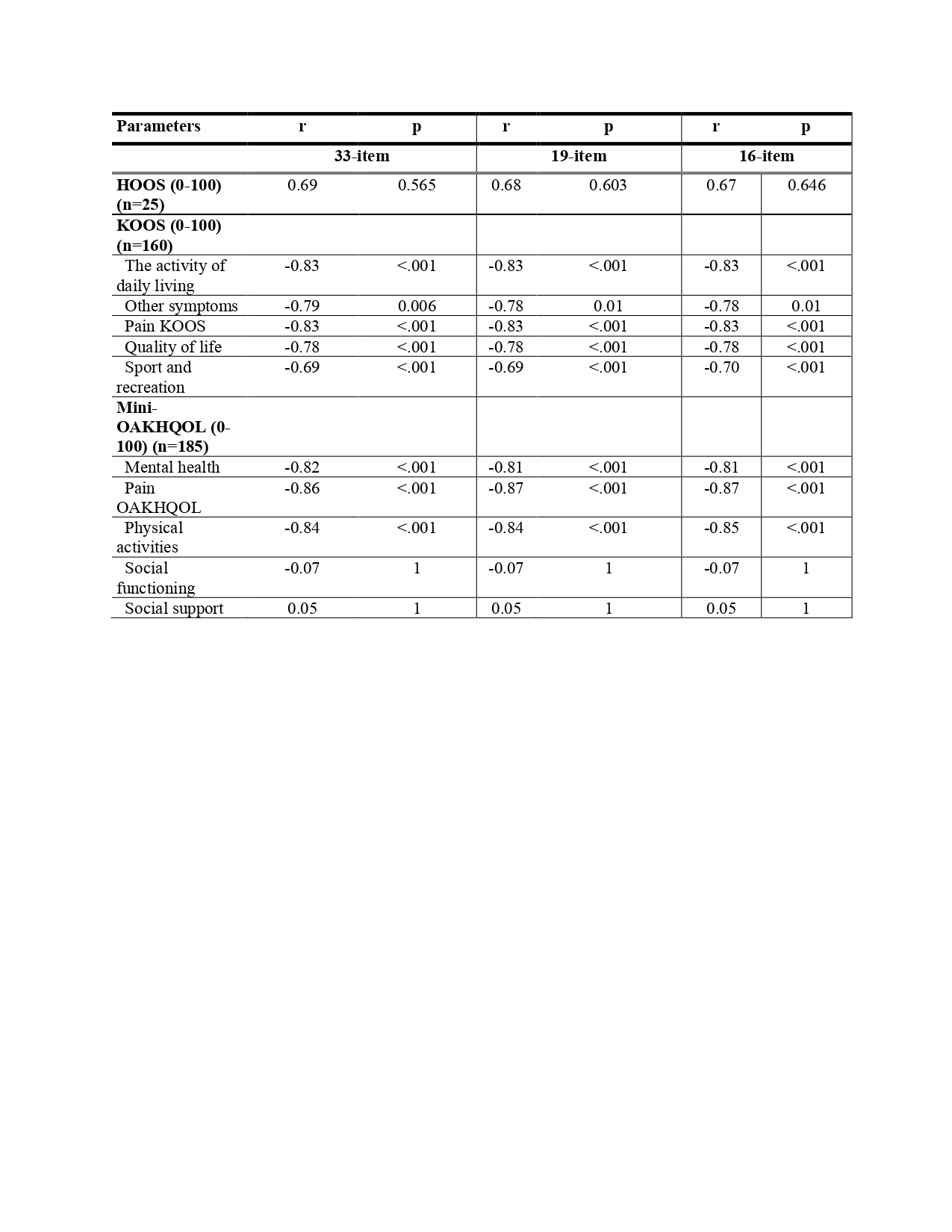Session Information
Session Type: Poster Session C
Session Time: 9:00AM-11:00AM
Background/Purpose: The Flare-OA is a recently developed self-reported questionnaire to assess the occurrence and severity of flares in knee and hip osteoarthritis (OA). It evaluates five aspects (pain, swelling, stiffness, consequences of symptoms, and psychological) of flare. This study aimed to translate and cross-culturally adapt the Flare-OA and its short forms using classical psychometric analysis methods in a Turkish population.
Methods: The French/English version of the questionnaire was cross-culturally adapted and translated into Turkish following an established forward–backward translation procedure. The Turkish version was checked by an expert committee for translation understandability, interpretation, and cultural relevance with ten patients (Face validity). Patients who were≥45 years of age with clinical and radiological OA of the knee or hip, according to ACR criteria were included. The Flare OA scale consists of 33 items and has been reduced to 19 items by factor analysis and content approach. Further work with the Rasch analysis allowed to refine and shorten the questionnaire to a 16-item version with a satisfactory interval scale. The reliability of Flare-OA was assessed by internal consistency (Cronbach’s alpha coefficient) and test-retest reliability at 15 days in patients without change. The sensitivity to change was assessed by standardized response mean (SRM) in those reporting change over the period. The convergent validity was assessed by the correlation of the Flare-OA with the Hip Disability and Osteoarthritis Outcome score (HOOS), Knee Injury and Osteoarthritis Outcome Score (KOOS), and the Mini Osteoarthritis Knee and Hip Quality of Life Questionnaire (Mini-OAKHQOL).
Results: A total of 185 (71.9% females) patients with a mean age of 63.2 (SD:9.1) years participated. One hundred-sixty (86.5%) of the patients had knee OA, 25(13.5%) had hip OA, and 70 (37.8%) had experienced worsening of the knee or hip OA during the last four weeks. The confirmatory factor analysis found the model with 19 items acceptable (RMSEA=0.08; SRMR=0.05; and CFI=0.95). Cronbach’s alpha coefficient was 0.987 (95% CI:0.984-0.990) for 33-item, 0.978 (95% CI:0.973-0.982) for 19-item, and 0.972 (95% CI:0.966-0.978) for 16-item. The intraclass correlation coefficient was 0.913 (95% CI:0.868-0.943), 0.915 (95% CI:0.870-0.944), and 0.912 (95% CI:0.866-0.943) in 79 patients for the test–retest reliability of the 33, 19, and 16 items, respectively. Sensitivity to change (n=89) was good in 9 patients with flare improvement [SRM 1.2 (95% CI:0.6–1.7), 1 (95% CI:0.5–1.4, and 1 (95% CI:0.5–1.5); 33, 19, and 16 items, respectively] over the period. The discriminant validity was evidenced by a significant score difference [36.2 (95% CI:29.9-42.6), 36.6 (95% CI:30.2-43.0), and 36.7 (95% CI:30.3-43.0)]for 33, 19, and 16 items, respectively between patients with and without flare. Pearson’s correlation coefficients of the questionnaire with the other parameters for construct validity are represented in Table.
Conclusion: This study demonstrated that all the 33, 19, and 16-items Turkish versions of the Flare OA questionnaire are reliable and valid tools for assessing flaring in patients with knee and hip OA.
To cite this abstract in AMA style:
Duruöz M, Gezer H, Epstein J, Soudant M, Guillemin F. Cross-cultural Adaptation, Reduction, and Validation of the Turkish Versions of the Flare-OA Questionnaire for Hip and Knee Osteoarthritis [abstract]. Arthritis Rheumatol. 2023; 75 (suppl 9). https://acrabstracts.org/abstract/cross-cultural-adaptation-reduction-and-validation-of-the-turkish-versions-of-the-flare-oa-questionnaire-for-hip-and-knee-osteoarthritis/. Accessed .« Back to ACR Convergence 2023
ACR Meeting Abstracts - https://acrabstracts.org/abstract/cross-cultural-adaptation-reduction-and-validation-of-the-turkish-versions-of-the-flare-oa-questionnaire-for-hip-and-knee-osteoarthritis/

